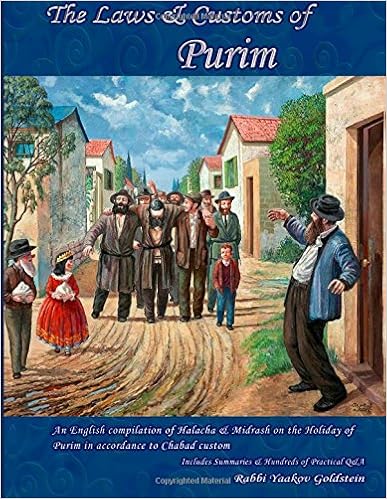
This article is an excerpt from our Sefer

Buy me on Amazon.com
The Feasts: [1]
In the third year of his reign he made a feast for all his servants and government officials, the leaders of each country under his reign. The feast lasted 180 days. At the conclusion of the feast he made a seven day feast for all the locals of the capital city of Shushan. Vashti likewise made a feast for the women within the palace courtyards.
Q&A
Why did Achashveirosh make a feast?
Some[2] say he made a feast in celebration of his successfulness in a recent war. Others[3] say it was his birthday celebration or celebration of being appointed king. Others[4] say he was celebrating the fact his kingship became permanent after three years of reign. Others[5] say it was his marriage celebration to Vashti. Others[6] say he was celebrating the fact that the Temple was not yet built, as the Gemara[7] states that according to his calculation the 70 years had passed and the Jews still did rebuild the Temple, hence invalidating the words of the prophet. The Midrash[8] says that the feast in Shushan was a plot set up by the king and Haman to persuade the Jews to get drunk and sin with the gentile women and hence have the wrath of G-d rest upon them.
What did Achashveirosh wear at the feast?[9]
At the feast Achashveirosh wore the clothing of the Temple priests [Bigdei Kehuna]. This is hinted to in the words “Yikar Tiferes”, as the word Tiferes is used in the Torah to refer to the uniform of the Kohanim.
What vessels did Achashveirosh supply by the feast?
The Gemara[10] states that after Achashveirosh made his calculation that the 70 years had passed, he took out the vessels of the Temple for use. The Midrash[11] states that these vessels were taken out and used by the feast of Achashveirosh.
What wine was served at the feast?[12]
Every person was served wine that was more aged than his own years.[13] Each participant was served the wine of his locality.
Were people forced to drink wine?[14]
It was a Persian custom to serve a very large glass of wine to guests. They were forced to drink the entire content even if they would die. This custom was not followed in this feast, as the feast was established to be done according to the will of each guest.
Achashveirosh fulfilled the wishes of every guest:[15]
The feast in Shushan was different than all the other feasts of the country. Achashveirosh commanded that the drinks be given without force. This applies not only to the drinks, but to all the details of this feast. Achashveirosh appointed chefs, bartenders, bakers and the like to attend to the specific needs and requests for every single guest.
Were the Jews invited to the feast and how many participated?
All the Jews were forced to participate in the feast.[16] However the Gedolei Yisrael, upon hearing of the feast, fled the city to avoid participation.[17] The Midrash[18] states that Mordechai preached to the Jews not to attend but the Jews did not listen and they all attended. A total of 18,500 Jews attended the feast and became drunk and sinned.
What did the Jews eat at the feast?
Some say that during the feast the Jews were forced to eat foods cooked by the gentiles [Bishul Akum].[19] However from the simple understanding of the verses it is evident that Kosher food was served.[20] The Midrash states that the Jews were not forced to drink Yayin Nesech.[21]
What sin did the Jews perform by joining the feast?
As stated above, some learn that the Jews ate non-Kosher foods. The Midrash[22] states that the Jews became drunk and fell prey to the gentile women. Others[23] state the sin was for the fact they partook in a feast that was celebrating the destruction of the Temple. This showed that the Jews relied more on the gentile king than on G-d, and hence Hashem concealed His providence from them and left them like a sheep without a Sheppard surrounded by 70 wolves.[24]
[1] 1/3-9
[2] Yalkut Shimoni 1047; Even Ezra 1/3
[3] Yalkut Shimoni 1047; The Yalkut Shimoni ibid states “Yom Genusia” this can refer to either a birthday or the day of the kings coronation.
[4] Rashi ibid
[5] Even Ezra 1/3
[6] Rif in Eiyn Yaakov 11b; Even Ezra 1/3
[7] Megillah 11b
[8] Esther Raba 18
[9] Megillah 12; Yalkut Shimoni 1047
[10] Megillah 11b
[11] Yalkut Shimoni 1048
[12] Megillah 12a
[13] If for example he was 40 years old he was given wine that was 50 years old. [Yalkut Shimoni 1048]
[14] Yalkut Shimoni 1048; Rashi 1/8; See Likkutei Sichos 36/164
[15] Likkutei Sichos 36/164 based on Yalkut Shimoni 1048; Rashi 1/8
[16] Esther Raba 18
[17] Yalkut Shimoni 1048
[18] Esther Raba 18
[19] Yalkut Shimoni 1048; Midrash Raba Shir Hashirim 7/8
[20] Likkutei Sichos 31 p. 170
[21] Esther Raba 2/13
[22] Esther Raba 7/18
[23] Rif on Eiyn Yaakov Megillah 12a
[24] Likkutei Sichos 31 p. 171


Leave A Comment?
You must be logged in to post a comment.